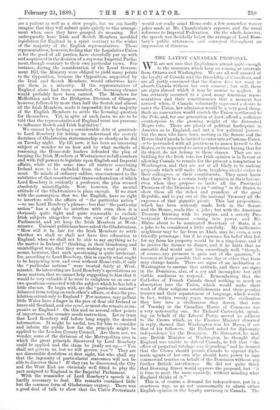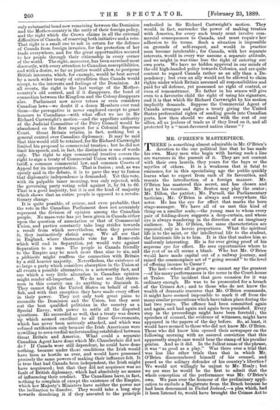THE LATEST CANADIAN PROPOSAL.
WE are not sure that Englishmen attend quite enough to the murmurs which keep on coming at intervals from Ottawa and Washington. We are all well assured of the loyalty of Canada and the friendship of Canadians, and are all justly convinced that the Union does not want to absorb Canada without her own consent ; but still, there are signs abroad which it may be unwise to neglect. It has certainly occurred to a good many American repre- sentatives and their constituencies that a moment has arrived when, if Canada voluntarily expressed a desire to enter the Union, her admission would be a very good thing. Such an annexation would stretch the Union northward to the Pole, and, for one generation at least, afford a sufficient counterpoise to the growing weight of the distrusted Negro vote. There are plenty of political harlequins in America as in England, and not a few political jesters ; but the men who have been moving in the Senate and the House that Canada be invited to enter into a Customs Union, or be persuaded with all gentleness to annex herself to the States, or be requested to enter a Conference having that for its object, do not belong to these classes. They are not bidding for the Irish vote, for Irish opinion is in favour of allowing Canada to remain for the present a temptation to Washington, and they are not at all likely to be making proposals which will make them laughing-stocks either to their colleagues or their constituents. They must know that there will be a certain body of opinion in their favour, even when they propose to invite all the Provincial Premiers of the Dominion to an " outing " in the States, to show them all the riches and grandeur of the great Republic, and to pay out of the national Treasury all the expenses of that gigantic picnic. This last proposition, which has been seriously made, both in the Senate and the House, reads like a joke ; but with the American Treasury bursting with its surplus, and a strictly Pro- tectionist Government coming into power, and Mr. Blaine about to be nominated Secretary of State, it is a joke to be considered a little carefully. My millionaire neighbour may be far from an Ahab, may be, even, a very friendly personage ; but if he expresses his belief that but for my farm his property would be in a ring-fence, and if he invites the farmer to dinner, and if he hints that an amicable deal would suit him exceedingly well, " though, of course, any pressure is quite out of the question," it becomes at least possible that some day or other that farm may change hands. There are signs of an inclination at Washington to assume that attitude, and there are signs in the Dominion, also, of a coy and incomplete but still visible readiness to respond. Remembering that the Catholics of French Canada dread nothing so much as absorption into the Union, which would make short work of their religious establishments and their peculiar tenures and their separateness of language, which would, in fact, within twenty years transmute the civilisation they love into a civilisation they detest, that vote of Tuesday in the Canadian House of Commons was a very noteworthy one. Sir Richard Cartwright, speak- ing on behalf of the Liberal Party, moved an address to the Crown which, as the Finance Minister observed in reply, showed that Washington was his Mecca, if not that of his followers. Sir Richard asked for diplomatic independence for the Dominion. He distrusted, he said, any British Minister at Washington, he thought that England was unable to defend Canada, he felt that " the effect of perpetual tutelage was degrading," and he desired that the Crown should permit Canada to appoint diplo- matic agents of her own who should have power to sign commercial treaties on behalf of the Dominion without any further British interference. He did not quite think that Downing Street would approve the proposal, but " it is time to meet the issue squarely, without minding what England thinks of it." This is, of course, a demand for independence, put in a courteous way, so as not unnecessarily to alarm either English opinion or the loyalty surviving in Canada. The only substantial bond now remaining between the Dominion and the Mother-country is the unity of their foreign policy, and the right which the Crown claims in all the external difficulties of Canada, of reserving both initiative and a veto. That right is a small one to ask in return for the defence of Canada from foreign invasion, for the protection of her trade everywhere, and for the great opportunities secured to her people through their citizenship in every corner of the world. The right, moreover, has been exercised most discreetly, with every attention to Canadian susceptibilities, and with a desire, so far as justice would allow, to postpone British interests, which, for example, would be best served by a much wider treaty of extradition than Canada would accept, to the interests and feelings of the Dominion. At all events, the right is the last vestige of the Mother- country's old control, and if it disappears, the bond of connection between the Kingdom and the Colony disappears also. Parliament now never vetoes or even considers Canadian laws—we doubt if a dozen Members ever read them—the prerogative is never employed except to grant honours to Canadians—with what effect we see in Sir Richard Cartwright's motion—and the appellate authority of the Judicial Committee of the Privy Council would be abandoned on the first request for a Colonial Supreme Court. Great Britain retains, in fact, nothing but a general control over Canadian diplomacy. It may be said that this would still be retained, for Sir Richard Cartwright limited his proposal to commercial treaties ; but he did not limit his speech, and, in fact, the distinction is one of words only. The right to sign commercial treaties covers the right to sign a treaty of Commercial Union with a common tariff, a common commercial law, and common Courts of Appeal for its interpretation. That is fusion ; and, as was openly said in the debate, it is to pave the way to fusion that diplomatic independence is demanded. Yet this vote, with its ts palpable inner meaning, was only rejected, with the governing party voting solid against it, by 94 to 66. That is a good majority, but it is not the kind of majority which shows that an entire people is opposed to a revolu- tionary change. It is quite possible, of course, and even probable, that the vote in the Canadian Parliament does not accurately represent the division of opinion among the Canadian people. No mass-vote has yet been given in Canada, either upon the question of annexation or that of Commercial Union, and parties constantly take long strides towards a result from which nevertheless, when they perceive it, they instinctively shrink away. We all see that in England, where thousands vote for a Home-rule which will end in Separation, yet would vote against Separation to a man. The people in Canada friendly to the Empire may be much more than nine to six, and a plebiscite might reaffirm the connection with Britain by a still heavier majority. Nevertheless, the existence of so large a party which considers absorption in the Union at all events a possible alternative, is a noteworthy fact, and one which a very little alteration in Canadian opinion might render all-important. We do not see that states- men in this country can do anything to airnirtigh it. They cannot fight the United States on behalf of cod- fish, and with that exception they have made every effort in their power. They not only took great pains to reconcile the Dominion and the Union, but they sent out the best qualified politician in the country as a Special Envoy, with power to settle all the disputed questions. He succeeded so well, that a treaty was drawn up which seemed excellent to all three Governments, which has never been seriously attacked, and which was refused ratification only because the Irish Americans were unwilling to see a cordial understanding established between Great Britain and America. What could a separate Canadian Agent have done which Mr. Chamberlain did not do ? If Canada were still dependent, he could have done nothing, because under those conditions the Irish would have been as hostile as ever, and would have possessed precisely the same powers of making their influence felt. It is true that had Canada been independent, the Irish might have acquiesced ; but that they did not acquiesce was no fault of British diplomacy, which had absolutely no means of influencing their conduct. The Canadians have, in fact, nothing to complain of except the existence of the Empire, which her Majesty's Ministers have neither the power nor the inclination to dissolve. They would take a long step towards dissolving it if they assented to the principle embodied in Sir Richard Cartwright's motion. They would, in fact, surrender the power of making treaties with America, for every such treaty must involve com- mercial consequences to Canada, and must requir e her adhesion to its terms. Such a situation is impossible on grounds of self-respect, and would in practice soon become intolerable ; for Canada, with her separate interests, would in every war assume a separate attitude, and we might in war-time lose the right of entering our own ports. We have no hidden approval in our minds of the old high-handed policy towards Colonies, and are quite content to regard Canada rather as an ally than a De- pendency ; but even an ally would not be allowed to claim rights under which Britain assumed all responsibilities and paid for all defence, yet possessed no right of control, or even of remonstrance. No father in his senses will give even to a favourite child the right of using his signature, and it is that which Sir Richard Cartwright by his motion implicitly demands. Suppose the Commercial Agent of Canada arranges and signs a treaty giving the United States preferential rights of sending goods into Canadian ports, how then should we stand with the rest of our allies, all as jealous of trade as if they lived on it, and all protected by a "most-favoured nation clause "



































 Previous page
Previous page